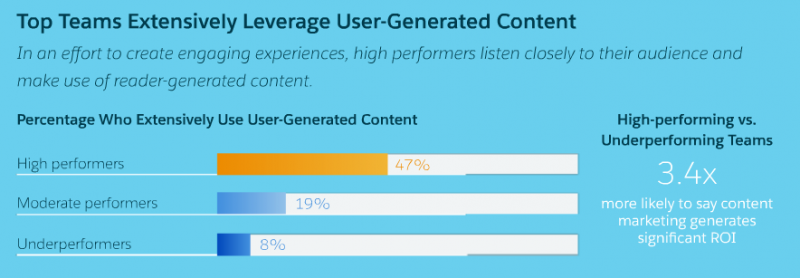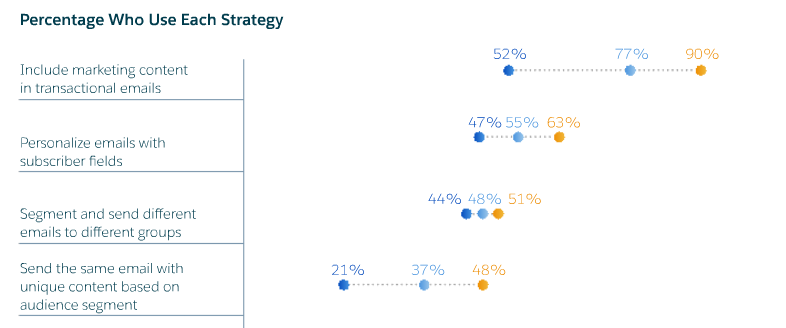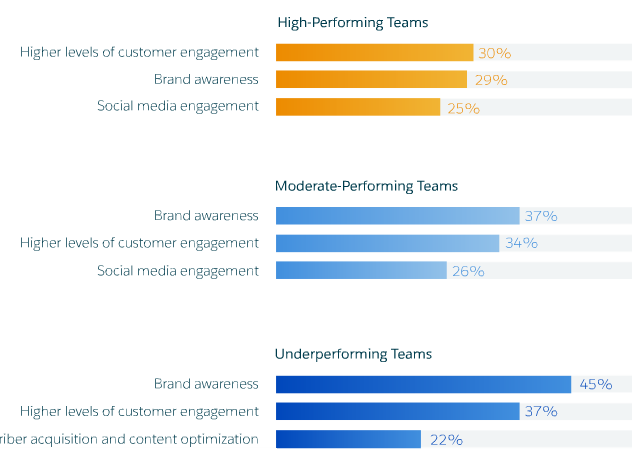Half of top-performing marketers use UGC extensively
Last week Salesforce published its 'State of Marketing' survey results, which included some interesting findings for data-driven marketers.
First of all, the over-ambitious title* and the survey's methodology tell you to take the findings with a grain of salt. 43% of the survey's 4,000 respondents were either CEO or owner, which correlates well with the apparently 39% of respondents from companies of 1-100 employees.
To highlight best practice, the survey designers created a sub-set of respondents (18%) classified as 'high-performing teams' because they responded that they were extremely satisfied with the outcomes from their marketing investment.
Which leads to the first compelling data point (reflected in this post's title):

"47% of high-performing marketers extensively use UGC (vs. 19% of moderate performers and 8% of underperformers)"
Essentially, 'happy' marketers are 6x more likely to use UGC than their 'unhappy' counterparts. I believe that this story is much greater than 'SMB marketers use UGC because it's free'; this is a case of effective marketers expanding their brand governance to include input, interpretation and involvement from communities outside the immediate control of the brand (to tell the brand's story). A lesson here: If you can't get third-parties interested in what your brand's all about, your brand's relevance is likely dwindling.
The second intriguing datapoint relates to email tactics:

"90% of high-performing marketers include marketing content in transactional emails (vs. 52% of underperformers)"
Note that the email tactics with the most significant spread between the happy marketers and the unhappy ones have to do with managing and delivering content. Our research called out the most successful brands with email, who use contextual triggers in the activity of their customers to queue up a valuable email message, not just a weekly, monthly or quarterly rhythm.
Finally, the third most valuable datapoint was hidden in the appendix, where they showed marketers' top priorities:

The top priority of high-performing marketers (and second priority for all others) was 'higher levels of customer engagement.'
The only term with less consensus about its definition than 'customer engagement' may be content marketing (whose confused definition and description led to a specific but important piece of research). Engagement sounds great to all marketers, but – when you drill in to it – you often find people talking about different things, and a gross assumption that engagement actually possesses value for marketers. What I suspect lies behind this desire for 'engagement' is a latent fear of brand irrelevance.
Arguably, marketers are telling themselves 'If people engage with our business, then our brand is relevant; if they don't, we're not". But, in an era where the brand that succeeds best may be the one that blends in best (it fits so well into your buying habits and preferences that it doesn't actually call attention to itself), then the crusade towards greater customer engagement may be leading marketers away from the promised land. More research on the topic of 'engagement' is required (and underway).
——————————————————
A side note for "inside 'baller" content marketers: Salesforce weirdly seems to define content marketing as a 'channel' – and one that lives alongside and outside other channels like social or email. They may be restricting the definition to off-site branded digital properties with an editorial bent (or just the company blog); this would be a mistake – and a poor definition – but it's not clear that the definition is one that was shared by the respondents. Reason why it's a poor definition: It encourages businesses to see content development as yet another silo and fail to integrate it effectively across all marketing channels, such as email, social, web, channel partners, apps, etc.
* 'State of Digital Marketing Technologies and Tactics, with a decided overrepresentation by CRM buyers and managers" would be a more accurate, if not quite as snappy, title.
